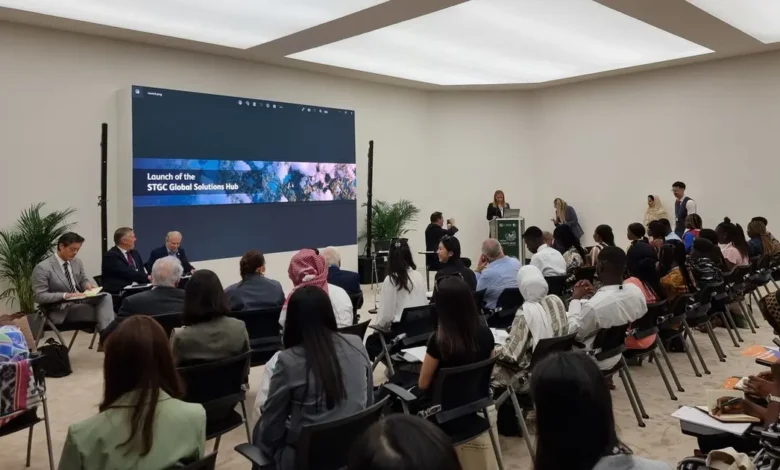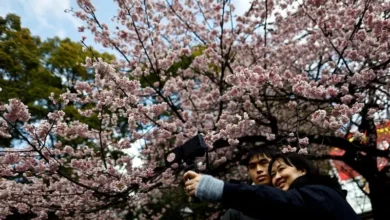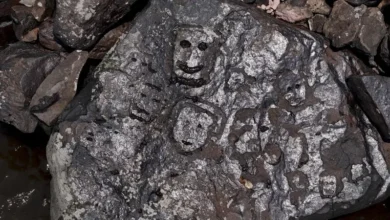Saudi green tourism: New research hub to offer sustainable, globally-usable solutions

Amid a global pressure to follow sustainable practices across key industries, Saudi Arabia is charging ahead with its green ambitions and turns to an environmentally conscious pathway to fuel its tourism push.
With wildfires raging in North America, floods in Asia, and higher temperatures in the Middle East, the effects of climate change are already impacting the lives of the world’s residents – slated to worsen as the earth warms.
“The reason why we’re here has to do with global sustainable tourism sector that is helping not only Saudi but the world to accelerate the transition towards net zero while we protect nature and environment, of course, and empower communities,” said Gloria Guevara, the Chief Special Advisor to the Saudi Tourism Minister Ahmed al-Khateeb.
“Saudi Arabia has become the epicenter, the place to go for travel and tourism,” Guevara, the former Mexican Secretary of Tourism, told Al Arabiya English on the sidelines of the MENA Climate Week in Riyadh.
The tourism industry expert, with over 30 years under her belt, formerly also held the title of President and CEO of the World Travel & Tourism Council (WTTC).
Saudi Arabia had announced plans to invest up to $1 trillion in its tourism industry, at least half of which has been earmarked for the NEOM mega-project. It is part of a larger years-long plan to transition away from oil-revenue and diversify its economy – a main component of which is tourism.
Most of these projects, like THE LINE and Trojena in NEOM, have ambitious plans to be supplied by a fully renewably sourced energy grid and produce little to no emissions in its operation.
“…In the case of the Kingdom, it’s refreshing and interesting as well to see the priority that Crown Prince Mohammed bin Salman has given to sustainability. And I love the fact that in every single project, sustainability is included,” the former minister said.
“The last 15 years, we have tried to move the agenda. We have tried to make this sector more sustainable. But in reality there were a lot of challenges,” mainly from a lack of data, Guevara said.
She added that Saudi Arabia’s Sustainable Tourism Global Center (STGC) team is engaging with young travelers – between 18 and 25 years old – to garner their views on sustainable means to travel and to provide a platform to engage with their thoughts.
The STGC was announced by Saudi Crown Prince Mohammed Bin Salman during the Saudi Green Initiative in October 2021, currently overseen by al-Khateeb. Over two years since its inception, Guevara said the Kingdom is actively developing solutions on the back of the concerns shared by the youth.
‘We don’t want to reinvent the wheel’
The STGC launched the Global Solutions Hub (GSH) on Tuesday at the MENA Climate Week.
The initiative is expected to invest in research and help quantify the impact that tourism has on the Kingdom and in other parts of the world.
During the launch, toolkits and best practice case studies were highlighted as key deliverables of the GSH to help accelerate the travel and tourism sector’s transition to net zero.
In 2019, the travel and tourism industry was responsible for 8.1 percent of the global greenhouse gas emissions, which is slated to jump by 20 percent by 2030.
“Our goal is to function as the premier knowledge hub, offering indispensable tools and solutions for key stakeholders, enabled by the Sustainable Tourism Global Center and the Ministry of Tourism in Saudi Arabia. Through these efforts, our aim is to empower and support the travel and tourism sector to champion environmental solutions and foster prosperity,” tourism minister al-Khateeb said in a statement.
Coinciding with the launch of the GSH, the team made available three toolkits focused on the use of solar thermal heaters, emissions reductions through sustainable food choices, and the cost savings of solar panels. It said it has plans to publish 25 toolkits in total over the next 36 months.
The Gulf state recently funded a study by the WTTC to determine the impact of tourism as far back as 2019.
Citing one of many global problems with tourism, Guevara said the center will partner with leading global educational and private institutions that have solutions to issues like food waste.
“We don’t want to reinvent the wheel,” the expert said.
“If the solution is there, we’ll partner with them so that we can have access to that solution. If the solution does not exist, we will partner with someone who leads to the solution,” Guevara added. The chief adviser called the process “action-oriented research and solutions,” and a move away from academic research.
Tourism triad
The recipe for a successful tourism-backed economy lies in a visionary approach, competent leadership, and resources – a triad of ingredients that Guevara says the Kingdom possesses.
“I truly believe Saudi Arabia has everything to become a top five destination in the world. It’s just a matter of execution,” the adviser said.
Bringing about changes like safety for women, preserving culture, spotlighting heritage sites, developing structure to natural wonders, and committing to conscious choices when doing so will help drive tourists to the Kingdom.
It also offers a variety of landscapes, from the beaches in Jeddah, the mountains in Taif, the valleys in AlUla, and the lush green terrain in Abha – something for every traveler.
Embodying ‘Hafawah’
As of July, over 60 million trips were made by Saudi nationals and residents alike, Guevera said, a marked increase in domestic tourism compared to years prior.
She tied this to the hospitality-bound nature of Saudis, in a value locally known as ‘Hafawah,’ that imbibes the spirit of hosting guests to the best of their abilities.
Despite rapid globalization and the mistrust that can seep into communities as a result, the Saudi government’s drive to actively engage local communities in its tourism drive, like in the case of AlUla, is reportedly producing results.
“We are seeing a lot of Saudis offering their houses, inviting people that they don’t even know,” said Guevara. “Saudis are very proud to share.”
Additionally, since the Kingdom only recently opened its doors to travelers and developed sights and experiences, the mystery surrounding these tourist attractions intrigue travelers to witness them first-hand.
Saudi Arabia was ranked second, globally, in terms of tourist arrivals during the first seven months of 2023 according to data from the United Nations World Tourism Organization (UNWTO).
According to the Kingdom’s Ministry of Tourism, the Gulf nation saw a 58 percent growth in visitor numbers during the first seven months of this year when compared to the same period in 2019.










